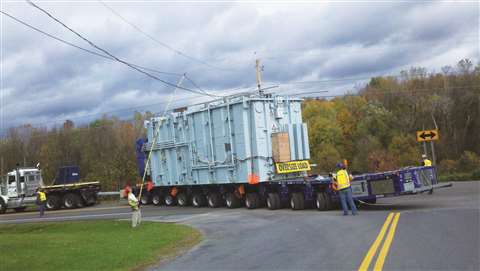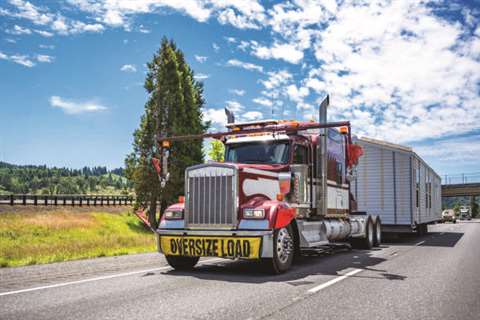What’s the latest news from the pilot car sector?
11 January 2023
Pilot cars are the unsung heroes of the highway. They are tasked with protecting both driver, load and all those who might cross paths with the heavy haul route. But the pilot car industry is on the cusp of change, especially when it comes to the streamlining of certification, and the involvement of law enforcement when escorting a load.
 One of the most important topics that has arisen out of the pilot car industry involves oversized loads and law enforcement.
One of the most important topics that has arisen out of the pilot car industry involves oversized loads and law enforcement.
The SC&RA is spearheading these developments through the work of the Transportation Pilot Car Committee. Their mission is to promote uniformity in standards and operations, to identify problems and recommend solutions in pilot car procedures, to promote safe movement of escorted loads and to act as may be necessary to achieve goals and objectives of the Transportation Group.
Labor shortage concern
As a result, the Pilot Car Committee has a finger on the pulse of the latest news and initiatives coming out of the industry. In speaking with Chris Smith, vice president transportation, SC&RA, one of the most important topics that has arisen out of the pilot car sector involves the issue of oversized loads and law enforcement involvement.
“A lot of states require that law enforcement escort the load, especially when dealing with things like moving utility poles or traffic closures, or other really sensitive public safety kind of projects,” said Smith. “They won’t want private pilot cars. The issue at hand is that law enforcement is running into a lot of the same labor shortage issues that the rest of the world is. Carriers are reporting to us that they’re having major delays on their loads because there isn’t enough law enforcement ready and able to join them, and they’re getting stuck.”
Filling the gap of availability
Smith also cited a specific example of several Canadian SC&RA members recently developing a program in Ontario to solve this exact issue. Following the blessing of the Ontario government, they are working on a program to train private pilot cars to do the kinds of things that law enforcement normally does.
“They’re filling that gap of the availability issue,” said Smith.
Officially, the province of Ontario continually found itself with a lack of personnel to supply police escorts for oversize loads.
“Ontario is a big province, and the Ontario provincial police has a large task force with a lot of responsibilities from their normal duties to construction escorts, special projects and oversize loads just added to the stress of supplying staff,” said Ed Bernard, president, Precision Specialized. “That is where the initiative began, where escorts would be certified, not only with escorting, but with their book 7, which is a construction escort process that teaches them how to close roads, direct, traffic, etc. There was initial skepticism by me and other carriers, mostly due to the travelling public’s lack of knowledge of oversized loads and escorts, but also the fact of the matter is the police lights are adhered to more so than orange escort lights.”
Bernard said he quickly came to realize the ease of booking Certified Superload Escorts (CSE) was a huge proponent. “Plus, they were our own people,” he said. “If they weren’t, the ones we contracted had been properly trained.”
Smith also cited a similar program in the works in Pennsylvania. It’s safe to say it will certainly be a hot button topic of discussion at the upcoming SC&RA Specialized Transportation Symposium, as more details of these initiatives are spotlighted. “It’s a complicated issue,” added Smith. “But it’s also an opportunity for the reputable pilot car companies to get some training. It’s also going to take the government relaxing things a bit and being able to trust some of the most sensitive transports to a private escort company.”

The National Pilot Car Association (NPCA) is working towards developing a central location to provide access to information that would verify a pilot car operator’s certification credentials.
“There are 14 states that require pilot car operators to be certified and there is no easy way to verify that a certification is true and valid,” said Bill Wegrzyn, president, NCPA. Currently, NPCA has received access to certification information from Washington, Arizona and Oklahoma, and is working with officials in Colorado, Utah and Florida. The goal is to provide verification of name, certification number, city and state and date of expiration of the certification.
While the project is ongoing, NPCA encourages employers, transportation companies and pilot car brokers to contact the individual government agency that oversees pilot car certifications.
STAY CONNECTED


Receive the information you need when you need it through our world-leading magazines, newsletters and daily briefings.




